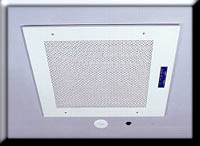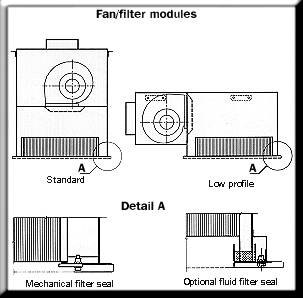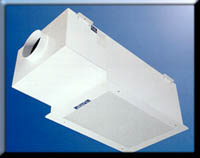|
Applications
Sophisticated manufacturing
and assembly environments such as Class 350 cleanrooms require the installation
of HEPA filters at the point of air entry to the room. This requirement
is set out in Australian Standard AS1386, Cleanrooms and clean workstations,
and the Code of Good Manufacturing Practice for Therapeutic Goods – Medicinal
Products published by the Department of Community Services and Health,Typical
cleanroom applications include the manufacture and packaging of sterile
pharmaceuticals, medical devices and electronics components.
 Description Description
TFP modules are terminal
HEPA filter plenums designed for ceiling installation in new cleanroom
construction, or for upgrading existing rooms. Modules are suitable for
use in ceilings of plasterboard or laminated-panel construction, and are
supplied with fittings to facilitate installation.A range of configurations
and sizes enables the system designer to select modules for any application.
Low-profile modules are recommended for installations where ceiling space
is restricted.Fan-assisted modules have been developed for applications
where the existing air supply system does not have the fan capacity to
overcome the additional static pressure of HEPA filters. Variable-speed
fans enable airflows to be regulated to meet requirements for room pressure
and airflow, and to compensate for filter dust loading.
Construction
 Housings.
Constructed in electro-galvanised steel with exterior finish in a special
baked enamel that has been developed for cleanroom and laboratory equipment.
Standard modules use a mechanical (gasket) filter seal, with the option
of fluid seal available on some models.Access on the underside of the module
(room side) for filter and fan service, an aerosol sample port and fan
speed controller obviates the need for access to the ceiling space.Pre-drilled
brackets are provided to facilitate suspension arrangements. Housings.
Constructed in electro-galvanised steel with exterior finish in a special
baked enamel that has been developed for cleanroom and laboratory equipment.
Standard modules use a mechanical (gasket) filter seal, with the option
of fluid seal available on some models.Access on the underside of the module
(room side) for filter and fan service, an aerosol sample port and fan
speed controller obviates the need for access to the ceiling space.Pre-drilled
brackets are provided to facilitate suspension arrangements.
HEPA filters.
Clyde-Apac
Microseal™ HEPA filters are manufactured to the most exacting standards
for critical applications. Each filter is individually certified to achieve
an arrestance efficiency of not less than 99.995% to the stringent BS3928
Sodium Flame test. All testing is conducted in a NATA-registered factory
laboratory and a NATA-endorsed test label, being an extract of the test
report, is affixed to each filter. A perforated metal guard, secured with
quick-release fasteners, protects the filter from mechanical damage, and
presents an attractive appearance to the room.
Fans.
Direct-drive fans with manual
speed controllers are used on fan-assisted units.
Electrical.
Fan-assisted units operate
on single-phase 240V, 50 Hz power via a 10A outlet.
Quality Assurance and
Control.
Clyde-Apac laminar flow
and HEPA filter products are manufactured in Australia under an accredited
Total Quality Management system. Please refer to our Standards
page.
Options
Prefilter in place of spigot
Alternative spigot dimensions
and orientation
TFPE configuration for exhaust
applications
‘Ultra-quiet’ variant of TFPBL
Series
Stainless-steel filter guard
On-site testing
TFP Series modules are factory-tested
and certified by a NATA-registered laboratory. Additional testing and certification
should be carried out on site prior to use, and subsequently:
After any electrical or mechanical
maintenance
After filter replacement
After re-location
At least annually
In special circumstances, e.g.
if faulty operation is suspected
Laminar Air Flow Services,
a NATA-registered laboratory and a division of Clyde-Apac, provides comprehensive
on-site maintenance, testing and certification services for safety cabinets,
laminar flow work stations, cleanrooms and HEPA filter installations. This
service is available from fully-equipped, NATA-registered laboratories
in major Australian centres.
Due to ongoing research
& development, Clyde-Apac reserves the right to modify the product
& specifications without notice.
|

 Description
Description
 Housings.
Constructed in electro-galvanised steel with exterior finish in a special
baked enamel that has been developed for cleanroom and laboratory equipment.
Standard modules use a mechanical (gasket) filter seal, with the option
of fluid seal available on some models.Access on the underside of the module
(room side) for filter and fan service, an aerosol sample port and fan
speed controller obviates the need for access to the ceiling space.Pre-drilled
brackets are provided to facilitate suspension arrangements.
Housings.
Constructed in electro-galvanised steel with exterior finish in a special
baked enamel that has been developed for cleanroom and laboratory equipment.
Standard modules use a mechanical (gasket) filter seal, with the option
of fluid seal available on some models.Access on the underside of the module
(room side) for filter and fan service, an aerosol sample port and fan
speed controller obviates the need for access to the ceiling space.Pre-drilled
brackets are provided to facilitate suspension arrangements.
